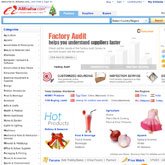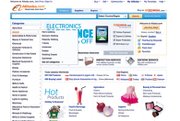Online Sourcing Websites Offer More Options to Protect Buyers
Online sourcing is a lot like online shopping. You can do it day or night, weekday or weekend.
As the online business world has become more sophisticated, more people are opting to forego long trips to Asia and other regions to source apparel and textiles using a host of websites that have popped up in the last years.
But still, some people are apprehensive, wondering what their recourse is if an order doesn’t show up or arrives damaged. “I would acknowledge that moving online can be daunting,” said Emily Baillieul, marketing director for Panjiva (www.panjiva.com), a New York–based website that has a database of more than 1 million buyers and suppliers from more than 190 countries.
But the website does have its own rating system. Company Chief Executive Officer Josh Green likens Panjiva to the Zagat guide—but for apparel manufacturing. The database employs a 1–100 rating system, similar to Zagat’s 1–30 system for restaurants. Companies can search various categories and narrow the search based on everything from garment type to volume and, more importantly, reputation and track records.
Baillieul said Panjiva has a team in Shanghai to vet many of the suppliers in China, where the bulk of apparel sourcing is done.
Panjiva also collects U.S. customs data and analyzes it to show the amount of goods foreign factories are shipping and to whom they are shipping. The data helps chart the track record of factories. Panjiva tracks 750,000 U.S. companies importing goods.
One of the key metrics is to see if buyers are happy with their factories and if they are placing more production orders. The website rates each supplier along three key dimensions, including track records, standards compliance and business basics, which includes a supplier scorecard that helps determine if a company is registered with authorities as well as an assessment of the trading environment in that country.
Security measures
When Mitch Free founded MFG.com in 2000 for the aerospace and aviation industries, he felt there needed to be a way for buyers and suppliers to feel secure working together over the Internet. “What I did was take a methodology similar to eBay, where there is a self-policing community. People provide feedback and ratings based on their transactions,” he said from his headquarters in Atlanta. The company also has offices in Paris and Shanghai. “That has become the core of MFG.com.”
It is also the core of MFGtextiles.com, a spinoff for the apparel industry launched in 2008. It now has about 2,100 apparel and textile companies listed on its supplier database, Free said. “We have millions of ratings on manufacturers that have been done by the community,” he explained.
The system works to match buyers’ design and production requirements with a factory’s capability and capacity levels. The Web-based technology allows factories to specify what types of jobs they are interested in and helps match their expertise with ideal buyer opportunities. Suppliers each get a multimedia Web page that allows them to tell their stories.
Factories set up RFQ (request for quotes) filters stating their areas of expertise, capacities and other criteria. Buyers create online RFQs with specs and are instantly matched with a list of suppliers. The buyers invite companies to bid, and once they receive those bids, they can analyze them and, finally, award the bids.
Alibaba.com, a sourcing website based in Hangzhou, China, has gotten increasingly more sophisticated since it was founded in 1999 as a platform for some of China’s smaller companies.
Today there are 72.8 million registered members, 9.6 million supplier storefronts and more than 5,900 product categories. Apparel and textiles now are one of the top five sourced categories. U.S. buyers and sellers make up 16 percent of the site’s traffic, said Linda Kozlowski, Alibaba’s director of global marketing and customer experience.
In recent months Alibaba.com launched an escrow service to ease users’ fears about getting paid on time, and it also launched a paid order-inspection service to verify merchandise quality.
To improve the quality of its supplier base, Alibaba.com started a service in October that does on-site verification of factories listed as “gold”-level suppliers. “We will confirm who they are and that the manufacturer does what they say they do and are categorized correctly,” Kozlowski said. —Deborah Belgum























